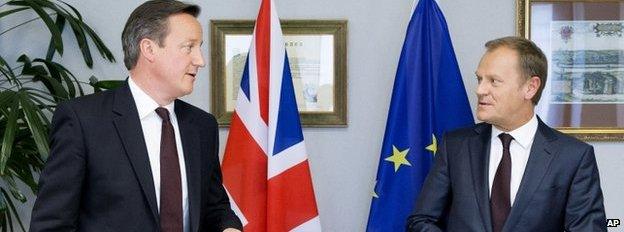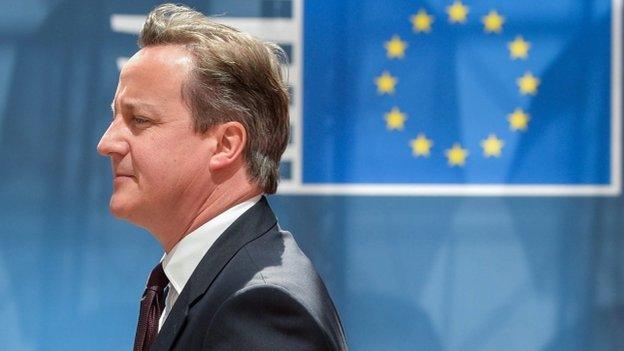David Cameron 'delighted' EU renegotiation under way
- Published
David Cameron: "People say things aren't possible... but once again we proved we will get things done"
David Cameron says he is delighted the process of "reform and renegotiation" of the UK's membership of the EU is "properly under way".
The PM was speaking in the early hours after formally setting out his aims to EU counterparts in Brussels.
He addressed EU leaders for 10 minutes at a summit dominated by the migrant crisis and Greek debt, although his exact speech was not reported.
The European Council's Donald Tusk said there was a will to help the UK.
Follow the latest developments on our live page
However Mr Tusk, who is overseeing the membership negotiations, added that basic values, such as freedom of movement to live and work within the EU, "were not for sale".
Detailed discussions would now begin in earnest, he added, with EU leaders next considering the matter in December.
'Safe for all'
Mr Cameron, who wants to reform the UK's membership of the EU before holding an in/out referendum of the British public by the end of 2017, tweeted that "significant progress", external had been made in Brussels.
The prime minister, who is under pressure from his Conservative backbenchers to deliver a far-reaching and lasting deal, has not set out in full detail what he wants but his key demands include:
An opt-out on the core EU aim of "ever closer union"
The sovereignty of national parliaments to be boosted, so groups of them can block proposed EU legislation
Safeguard the City of London and other financial centres outside the eurozone
Curb EU immigration by cutting benefits
Make the EU more streamlined and competitive
To get what it wants the UK believes it will need to rewrite treaties agreed by all 28 EU members.
Downing Street has said the prime minister remains committed to "proper, full-on treaty change" but it has acknowledged this is unlikely by the end of 2017 since it would trigger referendums in other EU countries as well.
The government is understood to be seeking "legally-binding" guarantees by the time of the referendum that EU treaties would be changed at some point in the future.

Analysis

By Ben Wright, BBC political correspondent
It was during the night's long, acrimonious discussion about Europe's migrant crisis that David Cameron was given time to set out his case. The prime minister's remarks to fellow EU leaders were brief and will not have been a surprise.
He had spoken to each of them in the weeks leading up to this summit - explaining why Britain will have an in/out referendum by the end of 2017 and sketching out his aims.
He has also made it clear Britain could leave the EU if he doesn't get a meaningful deal. For Britain, for Europe, this summit has marked a significant moment - and the start of official renegotiation talks between London and Brussels.
The prime minister of Malta said David Cameron "had worked the crowd well" over recent weeks. Italian Prime Minister Matteo Renzi was broadly supportive too, but said EU leaders had some different ideas to those proposed by Mr Cameron.
There remains a big question mark over exactly what the prime minister will be asking for.
Aspirations such as new powers for national parliaments, a British exemption from "ever closer union" and efforts to curb EU migration to Britain through welfare changes will be controversial.

The BBC's Europe editor Katya Adler said EU leaders accepted treaty change would be needed further down the line to reflect closer integration within the eurozone.
"The idea is to use that to get in the British changes as well but that cannot happen before 2017," she said.
Estonian prime minister Taavi Roivas told the BBC that treaty change could not be ruled out but a process which required a referendum in every country could pose some "difficulties".
"First of all we have to agree what we want to achieve and then we will talk the legal aspects, whether it is treaty change or secondary legislation," he told Radio 4's Today.
While the principle of freedom of movement could not be circumscribed in any way, he said EU leaders should be willing to listen to all the UK's ideas, including on benefit restrictions.
"I wouldn't draw any red lines just yet. My country men are coming to Britain only to work and to study and are not travelling for benefits so if Britain has this serious concern, we should be open for this discussion."
'Sensible'
UKIP leader Nigel Farage said the prime minister was "accepting the inevitable" that there would be no treaty change.
He said there would be "nothing really fundamental in Britain's renegotiation of its membership".
Former Conservative Home Office minister Damian Green, a pro-European MP, said it was "perfectly sensible for the prime minister to leave his options open" to get the results he wanted.
But Labour's shadow foreign secretary Hilary Benn said Mr Cameron was "signalling retreat while pretending that all he ever wanted was a post-dated cheque".
Mr Benn said Mr Cameron had "made a mess" and "should have known what the position of other countries would be".
Tory MP Steve Baker, co-founder of Conservatives for Britain, said he and colleagues were "more concerned" about the "substance" of any new relationship between the UK and the EU "rather than the mechanism" which will deliver it.
- Published26 June 2015

- Published25 June 2015